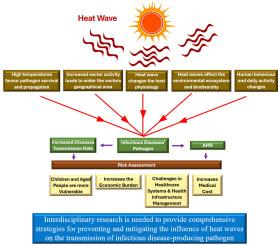Deciphering the impact of heat wave in the global surge of infectious diseases
IF 2.7
引用次数: 0
Abstract
The heat wave is the extreme episodes of climate change which is characterized as prolong period of abnormally elevated environmental temperatures other than the usual weather trends. In recent, the record-breaking environmental temperatures were observed all over the world, especially in the South Asia, Africa, and also in American countries. In Europe, over 70,000 additional deaths have been attributed to heat waves alone in 2022. This extreme climatic event has the implication to health risks and the potential rise in infectious diseases. This review establishes the multifaceted relationship between heat waves and infectious disease dynamics by the integration of existing literature and the emerging evidence from epidemiological, environmental, and laboratory studies. Heat waves create environments that favour the survival and propagation of various pathogens, including viruses, bacteria, protozoa, and fungi, thereby accelerate the speed of microbial biodiversity and evolutionary processes of microbes by progressively altering the ecosystem structures. Heat waves enhance the activity and distribution of insect vectors, leading to higher transmission rates of vector-borne sicknesses like dengue fever, chikungunya, malaria, Zika virus, Lyme disease and West Nile fever etc. Heatwave also could have the correlation to emerging antimicrobial resistance and pathogenic infections. Moreover, human behavioural changes during heat waves, may elevate the risk of food, air and waterborne diseases. However, the review provides a comprehensive understanding of how heat waves influence infectious disease dynamics. This review also emphasizes the need for interdisciplinary research, improved disease surveillance, and globally coordinated climate-health strategies to mitigate the risks.

解读热浪对全球传染病激增的影响
热浪是气候变化的极端事件,其特征是与通常的天气趋势不同,环境温度异常升高的时间延长。近年来,世界各地都出现了破纪录的环境温度,特别是在南亚、非洲和美洲国家。在欧洲,仅2022年就有7万多人死于热浪。这一极端气候事件对健康风险和传染病的潜在增加具有影响。本综述通过整合现有文献和来自流行病学、环境和实验室研究的新证据,建立了热浪与传染病动力学之间的多方面关系。热浪创造了有利于各种病原体(包括病毒、细菌、原生动物和真菌)生存和繁殖的环境,从而通过逐步改变生态系统结构加快了微生物生物多样性和微生物进化过程的速度。热浪加剧了病媒昆虫的活动和分布,导致登革热、基孔肯雅热、疟疾、寨卡病毒、莱姆病和西尼罗热等病媒疾病的传播率上升。热浪还可能与新出现的抗菌素耐药性和致病性感染有关。此外,热浪期间人类行为的变化可能会增加食物、空气和水传播疾病的风险。然而,这篇综述提供了对热浪如何影响传染病动力学的全面理解。本综述还强调了跨学科研究、改进疾病监测和全球协调的气候卫生战略以减轻风险的必要性。
本文章由计算机程序翻译,如有差异,请以英文原文为准。
求助全文
约1分钟内获得全文
求助全文
来源期刊

Hygiene and environmental health advances
Environmental Science (General)
CiteScore
1.10
自引率
0.00%
发文量
0
审稿时长
38 days
 求助内容:
求助内容: 应助结果提醒方式:
应助结果提醒方式:


